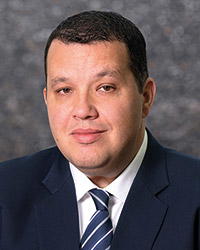

- Adam Boukadida
- Chief Financial Officer, Etihad Aviation Group

- Ben Poole
- Editorial Team, Treasury Management International (TMI)

- Eleanor Hill
- Editorial Consultant, Treasury Management International (TMI)
Etihad Airways recently raised US$1.2bn in the first sustainability-linked loan in global aviation with terms that relate to all three areas of ESG. Here, Adam Boukadida, Chief Financial Officer, Etihad Aviation Group, gives TMI the lowdown on the ground-breaking transaction, and outlines future plans for an even more sustainable operation and an increasingly diverse team.
It’s no secret that ESG-related financial instruments are becoming increasingly popular across a wide range of treasury activities. Nevertheless, it is still relatively rare to find examples where all three pillars of ESG are addressed simultaneously. But now Etihad Airways has landed a $1.2bn sustainability-linked ESG loan that does precisely that. Secured in October 2021, the financing was not only an industry first, but also the first sustainability-linked loan in the region to include KPIs covering every ESG pillar.
While this is the largest sustainable financing that the airline has undertaken to date, it is no stranger to this form of finance. In December 2019, Etihad announced it had raised $100m in funding linked to the 17 UN Sustainable Development Goals, while in October of the same year, it issued the first-ever aviation Transition Sukuk, which raised $600m. This latest financing takes the company’s sustainable-related funding to almost $2bn – all in the space of a couple of years.
Terms of the deal
The loan itself has a two-element structure: the first part is for $500m over four years, while the second is for $700m over five years. The loan terms are linked to multiple KPIs that are tied to ESG initiatives which will be independently assessed at least once a year:
- The environmental pillar aims to reduce the carbon emissions intensity of the Etihad passenger fleet, as measured in terms of CO2 emissions per revenue tonne-kilometres (RTK). Boukadida comments: “This commitment is linked to ambitious goals for reducing our emissions from our 2019 levels. We want to see a 50% improvement by 2035, on the path to net zero emissions by 2050. We are taking this extremely seriously, and even in this transaction [we] have key KPIs linked to it that will see us penalised if we don’t deliver results.” Essentially, this is the total number of revenue-generating tonnes of passengers and freight, multiplied by the distance flown. The environmental KPI is attached to the RTK metric.
- The social pillar has seen the company establish the Global Business Service Solution (GBSS) centre in Al Ain, UAE. This aims to contribute to the community’s socioeconomic development and increase employment and training of Emirati women in the aviation sector. KPIs will measure both female participation and ongoing training and development. “This pillar is very much about diversity, and it’s more than just hitting a number to signify diversity in the team,” explains Boukadida. “It considers the structure, the training and development, the mentoring, and coaching in a normalised development strategy. We are committed to this in the KPI [targets] and again, we face financial and legal penalties if we do not perform.”
- The governance pillar, meanwhile, has a KPI that will be linked to the Integrity Score, a comprehensive measure used to assess the overall internal culture of integrity at the airline. “We’ve embarked on a journey setting what we believe to be the highest corporate standards on governance and ethical behaviour,” says Boukadida. “Our integrity programme is a mandatory annual learning and development governance-based test of our ethical behaviours and beliefs.”
Finding the right partners
In terms of getting the sustainability-linked loan off the ground, Etihad selected HSBC and First Abu Dhabi Bank (FAB) as the strategic partners and financiers. The two banks acted as joint ESG structuring banks, joint ESG coordinators, joint bookrunners and mandated lead arrangers. FAB also acted as facility agent.
“We’ve worked with both banks on many different projects previously, including on some of the green financing that we’ve carried out,” explains Boukadida. “This financing is something that we explored together, storyboarded and, again, we had the singular belief around the sustainable linkage to the broader transportation and aviation sector. It was a long time in the kitchen cooking – we worked very hard on it in the background.”
Etihad has faced specific challenges along the way, including the most prominent issue of the past two years – Covid-19. The pandemic shut down most air travel, so to secure such a level of financing and still be able to focus on sustainability is a credit to the company’s finance team. Boukadida also notes that keeping an eye on the future meant that the process of achieving the funds took a little longer than expected: “Being the first to do something is great, but being first means you also have to ensure you’re doing the right thing for yourself and those who have to follow in the future,” he says. “This meant that the terms and conditions, the documentation, and contracting took a little bit longer than we anticipated to ensure we were protecting everybody involved in the transaction.”
Spearheading sustainability
As evidenced by its previous sustainable financing efforts, sustainability has long been a critical focus for Etihad Airways. This is perhaps best encapsulated by the company’s Etihad Greenliner programme, which was first announced in 2019. Launched in partnership with Boeing, the programme uses the airline’s fleet of Boeing 787 Dreamliners to test green products, procedures, and initiatives to reduce aircraft carbon emissions.
“We’ve been quite open about our obsession around sustainability and collaborating with our colleagues across the sector to make a difference,” says Boukadida. “The first part of that was to restructure our fleet strategy, with a focus on the most modern and efficient operations possible.”
Since 2019, Etihad and Boeing have collaborated on areas including eco-friendly inflight products, optimised flight routings, sustainable fuel, and even brought in expertise from NASA to examine noise reduction as part of Boeing’s ecoDemonstrator programme. The results have been dramatic, as proven by Etihad’s EY20 Sustainable Flight from London Heathrow to Abu Dhabi in October 2021.
“That was the most sustainable flight that we have ever operated,” explains Boukadida. “We were able to use a combination of sustainable aviation fuel, or SAF, and various operational efficiencies learned over two years – such as optimising flight paths and trajectories and minimising contrails – to reduce carbon emissions by 72%. It’s something we should all be doing, particularly in industries that are not that naturally sustainable. We see this as a collaborative effort.”
At the 2021 Dubai Airshow, the Greenliner project substantially expanded as Etihad welcomed new partners Airbus and Rolls Royce. The airline will be adding a fleet of Rolls-Royce-powered Airbus A350 aircraft to its fleet this year. Doubling the number of aircraft manufacturers and engine providers in the programme will be a major step forward.
“It highlights the power of partnerships when we have ourselves, two manufacturers, plus Rolls-Royce and GE, all working together on this,” says Boukadida. “We are trying to spearhead aviation operational sustainability – and many do regard us as the leaders of the pack.”
Since the launch of the Greenliner programme, Etihad has also released a number of sustainability initiatives. For example, it has launched the Etihad Mangrove Forest, inviting guests, corporate accounts, and partners to reduce their carbon footprint by adopting mangroves in Abu Dhabi. It has also brought online the first aircraft carbon-offset programme in the Middle East to completely neutralise the CO2 emissions of its Greenliner aircraft for a year, and introduced a green loyalty offering that rewards guests for making sustainable choices.
Supporting, innovating, retaining
Enhancing the Greenliner programme is far from the only sizeable project that Etihad’s finance team has been involved with recently. The company is also changing its entire commercial interface system, and finance is playing a significant role in this initiative. “Our end-to-end operational system is moving to the Amadeus platform,” Boukadida explains. “This covers everything from web booking and revenue management to data management and passenger servicing solutions, and more. We’re supporting that from Finance, since there is a significant linkage to our activities as well.”
Alongside these significant technology projects, the world of treasury and finance is also responding to the numerous regulatory changes and global events that impact how the day job is executed, and Etihad is no different. “This year there’s transitioning from LIBOR and the introduction of federal corporate income tax in UAE which applies on or after 1 June 2023,” comments Boukadida. “The treasury team has done a great job to ensure that we are comfortable with that. Then there is uncertainty in terms of interest rates to manage. Treasurers and financial risk managers globally will be aware of this, but linked to it we also have to keep an eye on commodity prices and what’s going to happen in that space.”
Elsewhere, the focus on talent is a vital issue for Etihad, which was highlighted by the health crisis. “The pandemic has shown us the importance of the skill set that treasurers possess. That expertise is definitely in high demand,” says Boukadida. “With businesses short of cash, and revenues dropping because of the impact of Covid, treasury and finance professionals moved to the frontline. Retention of our top talent is now a continued focus for us all.”
In line with this goal, Boukadida and Etihad’s HR team have designed an educational programme entitled ‘Finance Leadership Team of the Future’. “This is a 12-month programme, internally tailored for non-technical skills development,” explains Boukadida. “It is across nine different modules that vary from presenting at board level to managing challenging teams, implementing and gaining buy-in, among others. It also has a mentoring component running alongside. We’ll provide this comprehensive ‘soft’ skill set so that when the opportunity for advancement comes up for those who have been through the programme, it should be an easier step up.”
With this focus on talent and sustainability, Etihad Airways will continue to raise the bar in the industry, thanks to the innovation and vision of its treasury and finance teams. And TMI looks forward to seeing where Etihad takes the profession next.




